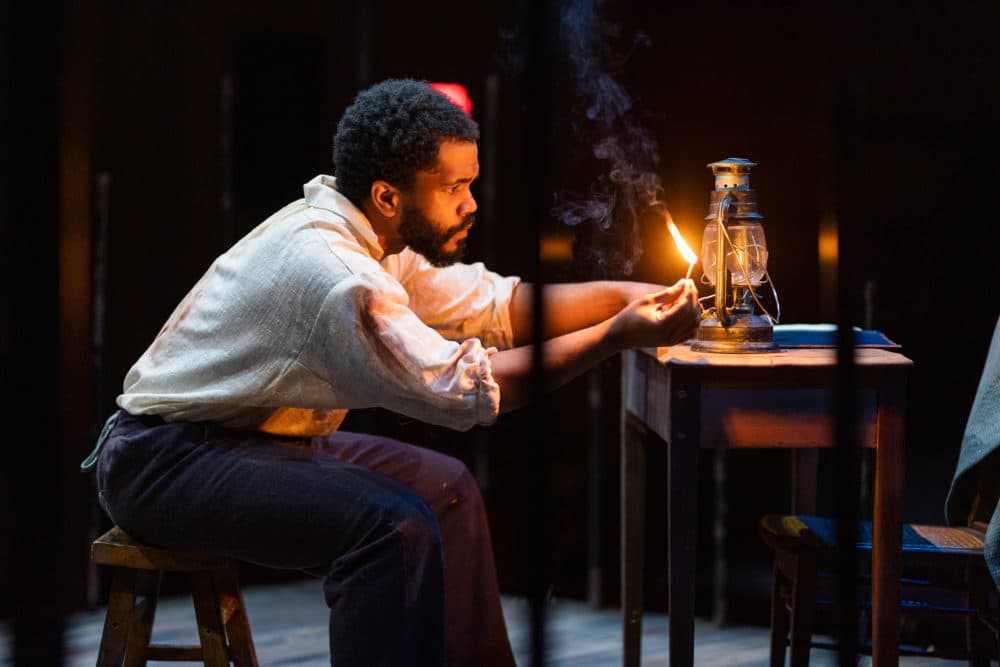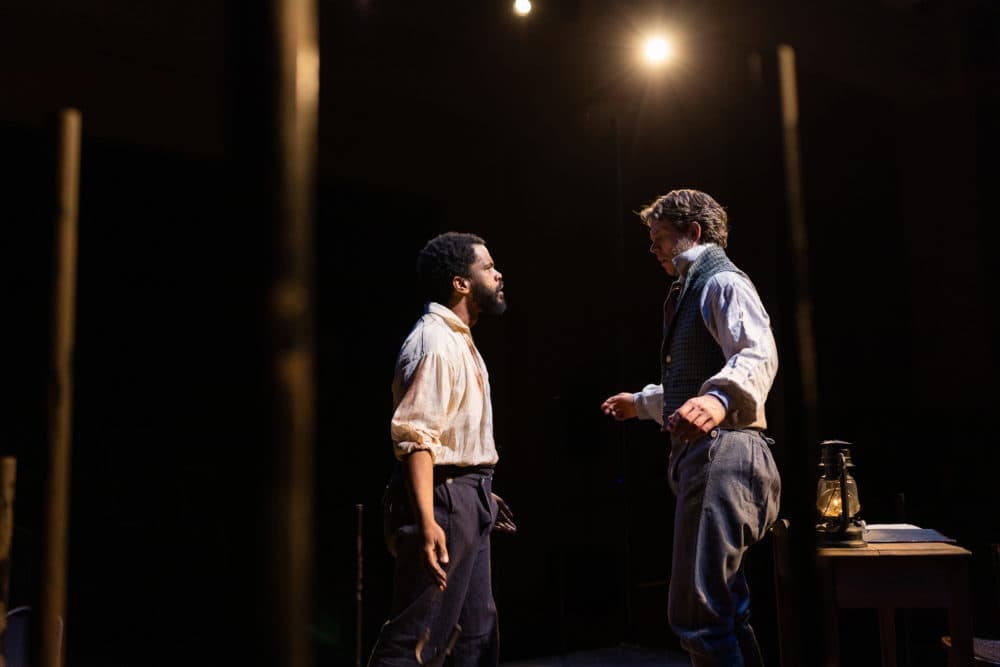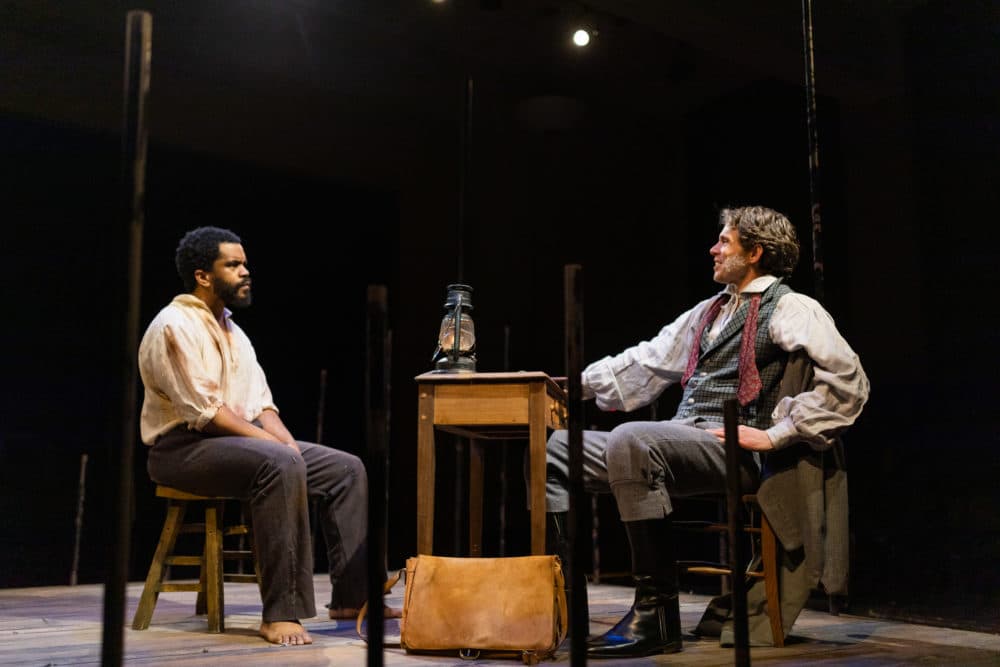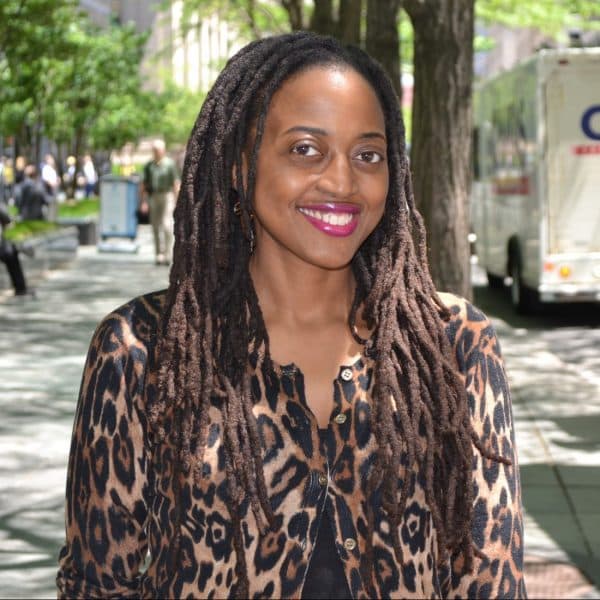Advertisement
'Nat Turner In Jerusalem' Imagines What The Slave Rebellion Leader's Last Night Was Like

Awash in blue light on stage, Nat Turner paces the confines of his cell the night before execution; his punishment for leading a slave rebellion and killing more than 50 people in 1831. The sound of heavy chains scraping across the floor weighs on the spirit. Before the sun rises, Turner’s lawyer visits to get information about uprisings to add to Turner's confession. He wants answers and remorse.
The Actors’ Shakespeare Project’s “Nat Turner in Jerusalem,” at Hibernian Hall through Feb. 24, imagines what Turner’s last night might have been like. At its center, the dialogue between Turner (Brandon G. Green) and his lawyer, Thomas R. Gray (Lewis D. Wheeler) — rippling with religious conviction and condemnation — never reaches a combustive conclusion. Rather, the play by Nathan Alan Davis serves up wrongdoings on both sides of a divide for audiences to contemplate long after the house lights come on.

“It's a simmering play,” says Christopher V. Edwards, ASP’s artistic director and producer of the play. He says a lot of this has to do with how the director, Benny Sato Ambush, let things evolve slowly between the actors playing Turner and Gray.
Before the show, Green — clad in a Trayvon sweatshirt and black cap — told me that he found a few parallels between himself and Turner. They're both close in age — early 30s. And they're both introverts.
The accomplished actor — who has worked with the Lyric Stage Company, Company One Theatre, the Front Porch Arts Collective — looks for roles that have a "theatrical activism" and wants to "play characters that help me speak my mind about the world we live in," he says.
His artist-activist roots run deep. Green's great-grandmother and her friends performed plays to inform people about voting during the civil rights movement.
Green enjoys telling Turner's story, but admits that it's "a challenge trying to find a way through him, but finding that true north of: he loves his people, he is a man of incredible faith ... it all helps center” the character.
The playwright’s approach allows Turner to appear complicated and nuanced, through his faith in God and his pursuit to make the guard (also played by Wheeler) somewhat of a friend. Gray, fearful of Turner, struggles to understand why Turner thinks it’s OK to kill, never considering that slaves can be murdered at will by their masters.
Advertisement
But, Edwards explains, “one man’s freedom fighter is another man’s terrorist.” There’s even more to Davis’ Turner in this script though, a vulnerability that swirls around him. Turner believes the revolt is God's work, but still has moments of struggle. It reminds Edwards of his visit to the Martin Luther King Jr. National Historical Park, which features a letter by King written to his wife, Coretta. In it, King shares his doubts and wonders if he’s doing the right thing.
“I find that very moving, this idea that someone finds a calling but they still need to find the certainty in it. Somehow, they're looking for signs, something to tell us that our existence means something,” he says.
Even with Turner’s nuance, some might feel that there’s no justification for such a violent act. Turner’s time differs significantly from today, but oppression still thrives. African-Americans continue to make strides in the U.S., but black people are more likely to be killed by police and less likely to be upwardly mobile.
This story reminds people that “we’ve come some way but at a basic philosophical level, how far have we really come? I think it’s important to have conversations about that,” says Edwards.

Instead of avoiding difficult topics, Edwards confronts them head on through theater. He joined ASP — a theater that "believes Shakespeare’s words are urgently relevant to our times" — in 2017 and previously served as artistic director at Nevada Conservatory Theatre. Since joining the company, he’s been working to shake things up a little and challenge what’s considered classical theater.
When directing and acting, Edwards — who has produced more than 25 plays — says he seeks to provide ways for people “who don't often get the opportunity to see theater, to see it, for them to see themselves in the plays and to show people that [might be] disenfranchised or underserved that their stories are valid and that they are heroes too."
Both Edwards and Green use theater to spark dialogue around their work and “Nat Turner in Jerusalem" provides a way to do that. The play offers up more questions than it answers, but that’s exactly what Edwards thinks theater is for. We’re supposed to leave with questions, he says.
It’s up to us to find our own answers.
The Actors’ Shakespeare Project’s “Nat Turner in Jerusalem,” runs now through Feb. 24 at Hibernian Hall in Roxbury.
